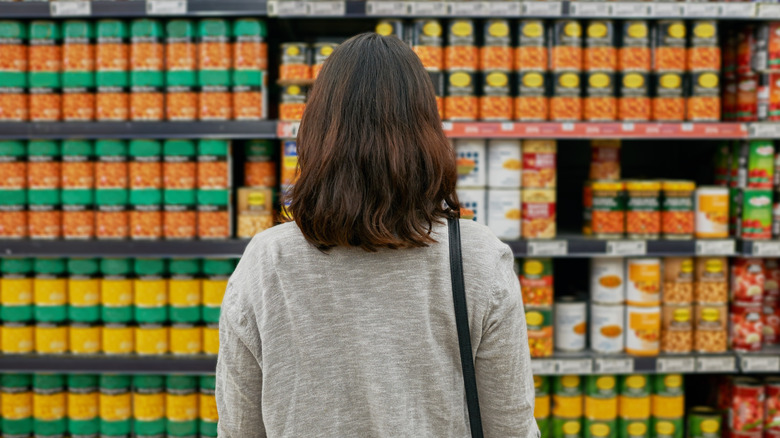A Popular Legume High In Antioxidants Is More Nutrient-Dense Than Blueberries
Antioxidants are a type of compound that can protect the body against cell damage caused by oxidative stress. When you consume antioxidants, your body becomes better positioned to fight inflammation, certain neurological disorders, and even cancer. (Read up on some surprising things that can cause inflammation.)
Consuming foods rich in antioxidants can strengthen the body's defenses. Take blueberries, for example: a single cup can have pretty much all the antioxidants you need in a day (via a 2004 study in the Journal of Agricultural and Food Chemistry). That's terrific, of course, but what if you're tired of blueberries and want to get antioxidants from a different food source? In that case, head straight to the bean aisle and grab some black beans. Though black beans taste nothing like blueberries, they also provide a significant amount of antioxidants.
Additionally, black beans are more nutrient-dense. Comparing the same serving sizes, blueberries have more vitamin C (one of the vitamins that are also classified as antioxidants) and K, but black beans have the edge when it comes to B-vitamins, as well as vitamin E, protein, dietary fiber, calcium, iron, magnesium, potassium, phosphorus, and zinc.
The benefits of antioxidants in black beans
Among the kinds of antioxidants found in black beans are anthocyanins, which fall under the category of flavonoids. You can thank flavonoids for the vibrant colors in blueberries, black beans, and other plant-based foods.
Anthocyanins have shown great promise as being especially helpful for people with diabetes who want to better manage their glucose levels with food. In a 2022 study in Frontiers in Nutrition, diabetic rats were given an extract made from black beans. Within five weeks of consuming the anthocyanin-packed extract, the rats showed genetic changes that indicated their bodies were better able to provide protection against diabetic symptoms and responses.
These findings echo those from a 2020 study in Heliyon that examined the anti-diabetic potential of polyphenols, including anthocyanins (which are both flavonoids and polyphenols), in black beans and blue corn. The study concluded that the polyphenols in those foods could possibly pave the way for improved insulin resistance (read this to know whether you're at risk for insulin resistance) and efficient glucose metabolism in individuals with diabetes.
Other reasons to add black beans to your diet
Findings of a 2017 trial published in Nutrients noted that individuals who ate either chickpeas or black beans with their rice experienced slower digestion than those who only ate rice, leading to a more stable glycemic level rise for two hours. The trial did not specify that antioxidants were the cause of this phenomenon, but identified black beans as a potentially diabetic-friendly functional food.
What about the broader category of flavonoids? It turns out that they can be advantageous in other ways. This is great news, given that several flavonoids, including myricetin and quercetin, are found in black beans. A 2017 review in Molecules determined that, based on previous studies, flavonoids may inhibit the growth of some cancers, as well as provide cardioprotective assistance. Consequently, consuming black beans regularly may lower your likelihood of being diagnosed with cancer or heart disease later in life.
One caveat: Cooking beans lowers their antioxidant intensity, so keep that in mind when preparing black beans for your next meal.


